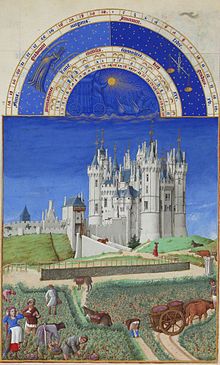
Back Цәыббрамза Abkhazian September Afrikaans September ALS Сыгын ай ALT ሰፕቴምበር Amharic Setiembre AN Hāligmōnað ANG سبتمبر Arabic ܐܝܠܘܠ ARC شتنبر ARY
| << | September | >> | ||||
|---|---|---|---|---|---|---|
| Su | Mo | Tu | We | Th | Fr | Sa |
| 1 | 2 | 3 | 4 | 5 | 6 | |
| 7 | 8 | 9 | 10 | 11 | 12 | 13 |
| 14 | 15 | 16 | 17 | 18 | 19 | 20 |
| 21 | 22 | 23 | 24 | 25 | 26 | 27 |
| 28 | 29 | 30 | ||||
| 2025 | ||||||
September is the ninth month of the year in the Julian and Gregorian calendars. Its length is 30 days.

September in the Northern Hemisphere and March in the Southern Hemisphere are seasonally equivalent.
In the Northern hemisphere, the beginning of the meteorological autumn is on 1 September. In the Southern hemisphere, the beginning of the meteorological spring is on 1 September.[1]
September marks the beginning of the ecclesiastical year in the Eastern Orthodox Church. It is the start of the academic year in many countries of the northern hemisphere, in which children go back to school after the summer break, sometimes on the first day of the month. Some Libras and Virgos are born in September, with Virgos being born on September 1st through September 22nd and Libras September 23rd through September 30.
September (from Latin septem, "seven") was originally the seventh month in the oldest known Roman calendar, the calendar of Romulus c. 750 BC, with March being (Latin Martius) the first month of the year until perhaps as late as 451 BC.[2] After the calendar reform that added January and February to the beginning of the year, September became the ninth month but retained its name. It had 29 days until the Julian reform, which added a day.
- ^ Office, Met. "Met Office: Changing seasons". webarchive.nationalarchives.gov.uk. Archived from the original on 2009-02-25.
- ^ H.H. Scullard, Festivals and Ceremonies of the Roman Republic (Cornell University Press, 1981), p. 84; Gary Forsythe, Time in Roman Religion: One Thousand Years of Religious History (Routledge, 2012), p. 14.